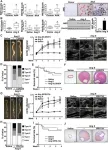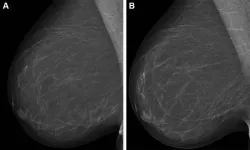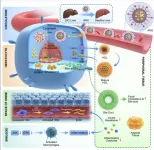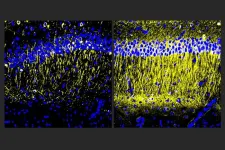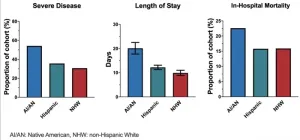(Press-News.org) New research led by the Institute of Psychiatry, Psychology & Neuroscience (IoPPN) at King’s College London has found that selective serotonin reuptake inhibitor (SSRI) treatment for postnatal depression is associated with improvements in child behaviour up to five years after childbirth.
Up to 15% of women experience postnatal depression which has been shown to be associated with poor outcomes for mothers’ and their children. Researchers at King’s IoPPN, in collaboration with the University of Oslo, analysed data from over 61,000 mothers and their children recruited during pregnancy from the Norwegian Mother, Father and Child Cohort Study. The researchers investigated how postnatal SSRI treatment modified the negative outcomes associated with postnatal depression in mothers and their children.
The study, published in JAMA Network Open, found that SSRI treatment for postnatal depression was associated with better outcomes up to five years after childbirth than mothers with postnatal depression who did not take SSRIs. These included reduced child behavioural difficulties (such as conduct problems and antisocial behaviour), child ADHD symptoms and maternal depression, as well as improved satisfaction in partner relationships.
The findings suggest that SSRI treatment could bring mid- to long-term benefits to women with postnatal depression and their children by reducing the risk of several negative outcomes that are associated with postnatal depression.
Dr Kate Liu, Research Associate at King’s IoPPN and first author of the study, said: “Postnatal depression is a common psychiatric disorder that affects 10 to 15 per cent of women in the first year after childbirth. In the UK however, only three per cent of women with postnatal depression receive SSRI treatment. This is likely due to a lack of awareness of postnatal depression, alongside concerns about the long-term impact that taking antidepressant medications in the postnatal period may have on child outcomes. Our study found no evidence suggesting that postnatal SSRI treatment conferred an increased risk for child development. In fact, we found that postnatal SSRI treatment reduced maternal depression and child behavioural difficulties that are associated with postnatal depression.”
Of the 61,081 mothers recruited in week 17-18 of pregnancy, 8,671 met the diagnostic criteria for postnatal depression at six months postpartum and 177 of these received postnatal SSRI treatment. Mother and child outcomes, including maternal depression and child emotional and behavioural difficulties, were measured when the child was ages 1.5, three and five. Maternal reported partner relationship satisfaction was measured at six months, 1.5 years and three years postpartum.
Researchers found that more severe postnatal depression was associated with higher levels of future maternal depression, poorer partner relationship satisfaction, higher levels of child emotional and behavioural difficulties, poorer motor and language development and increased ADHD symptoms.
Postnatal SSRI treatment mitigated the association between postnatal depression and maternal depression at 1.5 and five years postpartum, child behavioural difficulties at ages 1.5 and five years, ADHD symptoms at age five, and relationship satisfaction across all measured timepoints. In addition, postnatal SSRI treatment mitigated the negative association between postnatal depression symptoms and maternal depression at five years postpartum even when the level of postnatal depression did not meet the researchers’ diagnostic threshold.
Dr Tom McAdams, Wellcome Trust Senior Research Fellow at King’s IoPPN and senior author of the study, said: “Postnatal depression is under-recognised and undertreated. It's critical that we view it as the severe mental illness that it is and ensure it is treated properly to mitigate some of the associated negative outcomes in mothers, children and wider family. Our study found no evidence that SSRI treatment for mothers affected by postnatal depression was linked with an increased risk for childhood emotional difficulties, behavioural problems or motor and language delay.”
The study was supported by funding from Wellcome and The Research Council of Norway.
Ends
Long-term maternal and child outcomes following postnatal Selective Serotonin Reuptake Inhibitor treatment (Chao-Yu Liu, Eivind Ystrom, Tom A. McAdams) was published in JAMA Network Open (DOI: 10.1001/jamanetworkopen.2023.31270).
Once the embargo lifts, the paper will be available at: https://jamanetwork.com/journals/jamanetworkopen/fullarticle/10.1001/jamanetworkopen.2023.31270?utm_source=For_The_Media&utm_medium=referral&utm_campaign=ftm_links&utm_term=082923
For more information, contact Milly Remmington (Communications and Engagement Officer) on 07584 011592.
Notes to editors
The unique longitudinal dataset allowed researchers to follow up long-term child outcomes and adjust for potential confounding variables, including mothers’ self-reported lifetime history of depression, prenatal depression symptoms, income, education level, prenatal alcohol consumption. The moderating effects of postnatal SSRI treatment remained significant for maternal depression at postpartum years 1.5 and five, child externalising problems at ages 1.5 and five, ADHD symptoms at age five and relationship satisfaction at postpartum years 1.5, three and five after adjusting for prenatal confounding and covariates.
About King’s College London and the Institute of Psychiatry, Psychology & Neuroscience
King's College London is one of the top 40 universities in the world and one of the top 12 in Europe (QS World University Rankings, 2021/22) and among the oldest in England. King's has more than 33,000 students (including more than 12,800 postgraduates) from over 150 countries worldwide, and 8,500 staff. King's has an outstanding reputation for world-class teaching and cutting-edge research.
The Institute of Psychiatry, Psychology & Neuroscience (IoPPN) at King’s is a leading centre for mental health and neuroscience research in Europe. It produces more highly cited outputs (top 1% citations) on psychiatry and mental health than any other centre (SciVal 2021), and on this metric has risen from 16th (2014) to 4th (2021) in the world for highly cited neuroscience outputs. In the 2021 Research Excellence Framework (REF), 90% of research at the IoPPN was deemed ‘world leading’ or ‘internationally excellent’ (3* and 4*). World-leading research from the IoPPN has made, and continues to make, an impact on how we understand, prevent and treat mental illness, neurological conditions, and other conditions that affect the brain.
www.kcl.ac.uk/ioppn | Follow @KingsIoPPN on Twitter, Instagram, Facebook and LinkedIn
END
Underutilized antidepressant treatment for postnatal depression associated with improved child outcomes at age five
2023-08-29
ELSE PRESS RELEASES FROM THIS DATE:
Broken by bison, aspen saplings having a tough time in northern Yellowstone
2023-08-29
CORVALLIS, Ore. – In northern Yellowstone National Park, saplings of quaking aspen, an ecologically important tree in the American West, are being broken by a historically large bison herd, affecting the comeback of aspen from decades of over-browsing by elk.
Findings of the research led by Luke Painter of Oregon State University were published today in Ecology and Evolution.
The study comes five years after Painter, who teaches ecology and conservation in the OSU College of Agricultural Sciences, published a paper in Ecosphere showing that wolf reintroduction in Yellowstone had been a catalyst for aspen recovery both outside and ...
Partners from more than 100 countries collaborate as LOINC® issues 1,945 new concepts in semiannual release
2023-08-29
INDIANAPOLIS -- LOINC® from Regenstrief Institute is issuing its semiannual content update with 1,945 new concepts to help health systems, laboratories and other health organizations exchange medical data. The release contains newly created content based on requests submitted by stakeholders from more than 100 countries.
LOINC version 2.75 is available for download from the LOINC website and via the LOINC Terminology Service using HL7® FHIR®. The updated version includes new, edited and newly mapped concepts ...
New study will examine impact of lifestyle physical activity on cognition for older adults
2023-08-29
Jason Yang has been awarded nearly $400,000 from the National Institute on Aging to explore the role of lifestyle physical activity (light movements, walking) in cognition among insufficiently active older adults with higher risks for Alzheimer’s or related dementias. The exercise science assistant professor will use the two-year R21 grant to help determine if frequent and regular engagement in lifestyle physical activity over time may benefit cognitive function for this population.
A ...
More sleep could reduce impulsive behavior in children
2023-08-29
Sleep is a critical part of a child’s overall health, but it can also be an important factor in the way they behave.
According to a new study from the Youth Development Institute at University of Georgia, getting enough sleep can help children combat the effects of stressful environments.
“Stressful environments are shown to make adolescents seek immediate rewards rather than delayed rewards, but there are also adolescents who are in stressful environments who are not impulsive,” said lead author Linhao Zhang, a fourth-year doctoral student in UGA’s College of Family and Consumer Sciences. “We looked at what explains that link and what makes some people ...
New study sheds light on the role of Wnt/β-catenin signaling in abdominal aortic aneurysm
2023-08-29
Abdominal aortic aneurysm (AAA), a common degenerative vascular disease, particularly afflicts men over the age of 60, with up to 8% affected. Characterized by the abnormal dilation of the abdominal aorta, AAA risks a potentially fatal rupture. Despite increasing research efforts, effective pharmaceutical strategies to curb aneurysm growth remain elusive.
In a study published in the journal of Genes & Diseases, researchers from Sant Pau Hospital Research Institute and Biomedical Research Institute Sant Pau scrutinized the Wnt signaling pathway's deregulation in human abdominal aortic aneurysm (AAA). This ...
Combining AI models improves breast cancer risk assessment
2023-08-29
OAK BROOK, Ill. – Combining artificial intelligence (AI) systems for short- and long-term breast cancer risk results in an improved cancer risk assessment, according to a study published in Radiology, a journal of the Radiological Society of North America (RSNA).
Most breast cancer screening programs take a one-size-fits-all approach and follow the same protocols when it comes to determining a woman’s lifetime risk of developing breast cancer. Using mammography-based deep learning models may improve the accuracy of breast cancer risk assessment and can also lead to earlier ...
Anionic nanogel delivers effective anti-obesity drug to mouse livers
2023-08-29
An anti-obesity drug can be delivered selectively to the liver using a nanogel-based carrier, according to a study. Synthetic thyroid hormone mimics are promising treatments for metabolic diseases including metabolic dysfunction-associated steatohepatitis (MASH), high cholesterol, type 2 diabetes, and inflammatory liver disease; however, the molecules are not highly bioavailable or potent, which are necessary to see significant weight loss. S. Thayumanavan and colleagues designed a nanogel-based carrier with anionic moieties on the surface ...
Australia’s Nuclear Science and Technology Organisation (ANSTO) selects Symplectic Elements to enable comprehensive research management
2023-08-29
Digital Science, a technology company serving stakeholders across the research ecosystem, is pleased to announce that Australia’s Nuclear Science and Technology Organisation (ANSTO) has chosen Symplectic Elements from Digital Science’s flagship products to advance awareness of its world-class research.
ANSTO is the home to some of Australia’s most significant national infrastructure for research. Thousands of scientists from industry and academia benefit from gaining access to ANSTO’s ...
Molecule reduces inflammation in Alzheimer’s models
2023-08-29
Though drug developers have achieved some progress in treating Alzheimer’s disease with medicines that reduce amyloid-beta protein, other problems of the disease including inflammation, continue unchecked. In a new study, scientists at The Picower Institute for Learning and Memory at MIT describe a candidate drug that in human cell cultures and Alzheimer’s mouse models reduced inflammation and improved memory.
The target of the new “A11” molecule is a genetic transcription factor called PU.1. Prior research has shown that amid Alzheimer’s disease, PU.1 ...
Disproportionate impact of COVID-19 on American Indians
2023-08-29
A study of COVID-19 patients at a New Mexico hospital finds that the virus hit American Indian patients particularly hard—even though Native American patients had fewer other illnesses or conditions than non-native patients. Douglas Perkins and colleagues analyzed data on 475 patients with COVID-19 infections from the University of New Mexico Hospital. The sample was 30.7% Native American, 47% Hispanic, and 18.5% non-Hispanic White. At admission, Native American patients were younger, more likely to need ...

